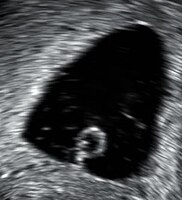
Photo from wikipedia
Certain chemotherapeutic drugs are toxic to ovarian follicles. The corpus luteum (CL) is normally developed from an ovulated follicle for producing progesterone (P4) to support early pregnancy. To fill in… Click to show full abstract
Certain chemotherapeutic drugs are toxic to ovarian follicles. The corpus luteum (CL) is normally developed from an ovulated follicle for producing progesterone (P4) to support early pregnancy. To fill in the knowledge gap about effects of chemotherapy on the CL, we tested the hypothesis that chemotherapy may target endothelial cells and/or luteal cells in the CL to impair CL function in P4 steroidogenesis using doxorubicin (DOX) as a representative chemotherapeutic drug in mice. In both mixed background mice and C57BL/6 mice, a single intraperitoneal injection of DOX (10 mg/kg) on 0.5 days post coitum (D0.5, post-ovulation) led to ~58% D3.5 mice with serum P4 levels lower than the serum P4 range in the PBS-treated control mice. Further studies in the C57BL/6 ovaries revealed that CLs from DOX-treated mice with low P4 levels had less defined luteal cords and disrupted collagen IV expression pattern, indicating disrupted capillary, accompanied with less differentiated luteal cells that had smaller cytoplasm and reduced StAR expression. DOX-treated ovaries had increased granulosa cell death in the growing follicles, reduced PCNA-positive endothelial cells in the CLs, enlarged lipid droplets and disrupted F-actin in the luteal cells. These novel data suggest that the proliferating endothelial cells in the developing CL may be the primary target of DOX to impair the vascular support for luteal cell differentiation and subsequently P4 steroidogenesis. This study fills in the knowledge gap about the toxic effects of chemotherapy on the CL and provides critical information for risk assessment of chemotherapy in premenopausal patients.
Journal Title: Biology of reproduction
Year Published: 2021
Link to full text (if available)
Share on Social Media: Sign Up to like & get
recommendations!